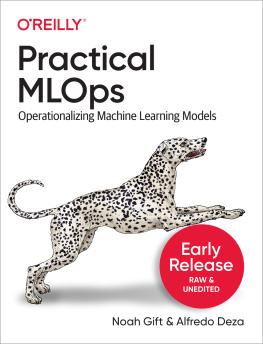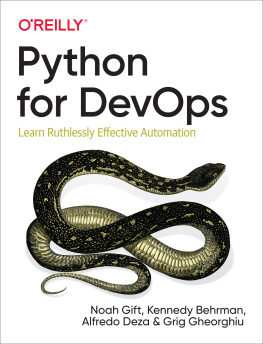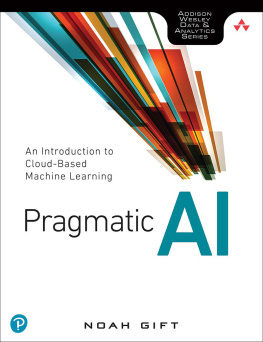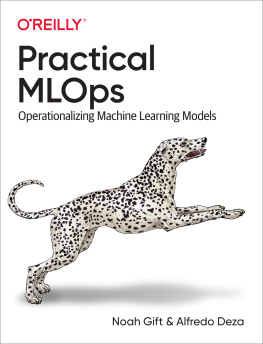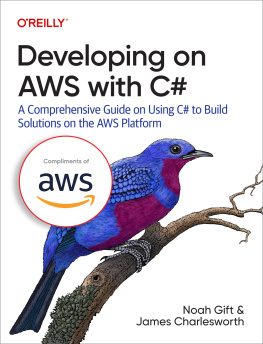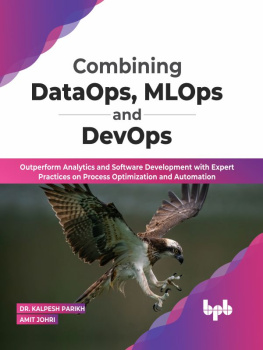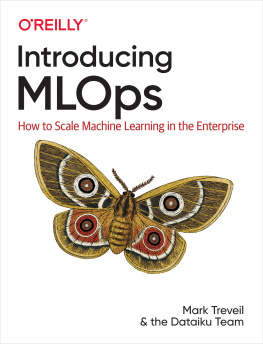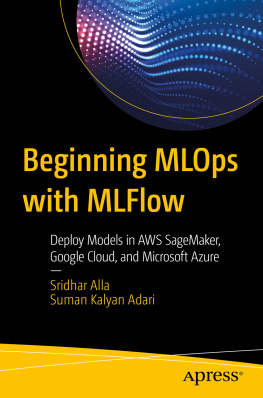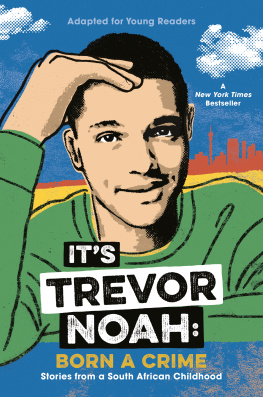Noah Gift - Practical MLOps
Here you can read online Noah Gift - Practical MLOps full text of the book (entire story) in english for free. Download pdf and epub, get meaning, cover and reviews about this ebook. year: 2021, publisher: OReilly Media, Inc., genre: Computer. Description of the work, (preface) as well as reviews are available. Best literature library LitArk.com created for fans of good reading and offers a wide selection of genres:
Romance novel
Science fiction
Adventure
Detective
Science
History
Home and family
Prose
Art
Politics
Computer
Non-fiction
Religion
Business
Children
Humor
Choose a favorite category and find really read worthwhile books. Enjoy immersion in the world of imagination, feel the emotions of the characters or learn something new for yourself, make an fascinating discovery.
- Book:Practical MLOps
- Author:
- Publisher:OReilly Media, Inc.
- Genre:
- Year:2021
- Rating:4 / 5
- Favourites:Add to favourites
- Your mark:
- 80
- 1
- 2
- 3
- 4
- 5
Practical MLOps: summary, description and annotation
We offer to read an annotation, description, summary or preface (depends on what the author of the book "Practical MLOps" wrote himself). If you haven't found the necessary information about the book — write in the comments, we will try to find it.
Practical MLOps — read online for free the complete book (whole text) full work
Below is the text of the book, divided by pages. System saving the place of the last page read, allows you to conveniently read the book "Practical MLOps" online for free, without having to search again every time where you left off. Put a bookmark, and you can go to the page where you finished reading at any time.
Font size:
Interval:
Bookmark:

by Noah Gift and Alfredo Deza
Copyright 2021 Noah Gift and Alfredo Deza. All rights reserved.
Printed in the United States of America.
Published by OReilly Media, Inc. , 1005 Gravenstein Highway North, Sebastopol, CA 95472.
OReilly books may be purchased for educational, business, or sales promotional use. Online editions are also available for most titles (http://oreilly.com). For more information, contact our corporate/institutional sales department: 800-998-9938 or corporate@oreilly.com .
- Acquisitions Editor: Rebecca Novack
- Development Editor: Melissa Potter
- Production Editor: Daniel Elfanbaum
- Interior Designer: David Futato
- Cover Designer: Karen Montgomery
- Illustrator: Kate Dullea
- October 2021: First Edition
- 2021-02-04: First Release
- 2021-03-22: Second Release
- 2021-05-21: Third Release
- 2021-07-19: Fourth Release
See http://oreilly.com/catalog/errata.csp?isbn=9781098103019 for release details.
The OReilly logo is a registered trademark of OReilly Media, Inc. Practical MLOps, the cover image, and related trade dress are trademarks of OReilly Media, Inc.
The views expressed in this work are those of the authors, and do not represent the publishers views. While the publisher and the authors have used good faith efforts to ensure that the information and instructions contained in this work are accurate, the publisher and the authors disclaim all responsibility for errors or omissions, including without limitation responsibility for damages resulting from the use of or reliance on this work. Use of the information and instructions contained in this work is at your own risk. If any code samples or other technology this work contains or describes is subject to open source licenses or the intellectual property rights of others, it is your responsibility to ensure that your use thereof complies with such licenses and/or rights.
978-1-098-10294-4
[LSI]
With Early Release ebooks, you get books in their earliest formthe authors raw and unedited content as they writeso you can take advantage of these technologies long before the official release of these titles.
Please note that the GitHub repo will be made active later on.
If you have comments about how we might improve the content and/or examples in this book, or if you notice missing material within this chapter, please reach out to the editor at .
Weve both spent most of our careers automating things. When we first met and Alfredo didnt know Python, Noah suggested automating one task per week. Automation is a core pillar for MLOps, DevOps, and this book throughout. You should take all the examples and opinions in this book in the context of future automation.
If Noah could summarize how he spent from 2000-2020, it was automating just about anything he could, from Film Pipelines to software installation to Machine Learning pipelines. As an engineering manager and CTO at startups in the Bay Area, he built many data science teams from scratch. As a result, he saw many of the core problems in getting machine learning to production in the early stages of the AI/ML revolution.
Noah has been an adjunct professor at Duke, Northwestern, and UC Davis in the last several years, teaching topics that primarily focus on Cloud Computing, Data Science, and machine learning engineering. This teaching and work experience gives him a unique perspective about the issues involved in the real-world deployment of machine learning solutions.
Alfredo has a heavy ops background from his System Administrator days, with a similar passion for automation. It is not possible to build resilient infrastructure without push-button automation. There is nothing more gratifying when disaster situations happen than re-running a script or a pipeline to recreate what crashed.
When Covid-19 hit, it accelerated a question we both had, which was, why arent we putting more models into production? Noah touched on some of these issues in an article he wrote for Forbes https://www.forbes.com/sites/forbestechcouncil/2019/02/04/why-there-will-be-no-data-science-job-titles-by-2029/?sh=ffbf7e13a8f6. The summarized premise of the article is something is wrong with data science because organizations are not seeing returns on their investments.
Later at OReillys Foo Camp, Noah led a session on Why cannot we be 10X faster at ML in Production?, where we had a great discussion with many people, including Tim OReilly, Mike Loukides, Roger Magoulas, and others. The result of that discussion was: yes; we can go 10X faster. So thanks to Tim and Mike for stirring such as fascinating discussion and getting this book on its way.
Machine Learning feels a lot like many other technologies in the last several decades. At first, it takes years to get results. Steve Jobs talks about how NeXT wanted to make it 10X faster to build software (and he did): Watch The Steve Jobs Interview On YouTube Here. What are some of the problems with Machine Learning currently?
Focus on the code and technical details vs. the business problem
Lack of Automation
HiPPO (Highest Paid Persons Opinions)
Not cloud-native
Lack of urgency to solve solvable problems
Quoting one of the things Noah brought up in the discussion: Im anti-elitism across the board. Programming is a human right. The idea that there is some priesthood that is only allowed to do it is just wrong. Similar to machine learning, it is too crucial for technology to only lie in the hands of a select group of people. With MLOps and AutoML, these technologies can go into the publics hands. We can do better with machine learning and artificial intelligence by democratizing this technology. Real AI/ML practitioners ship models to production, and in the real future, people from doctors, lawyers, mechanics, and teachers will use AI/ML to help them do their jobs.
We designed this book so that you can consume each chapter as a standalone section designed to give you immediate help. At the end of each chapter are discussion questions that are intended to spur critical thinking and technical exercises to improve the materials understanding.
These discussion questions and exercises are also well suited for use in the classroom in a Data Science, Computer Science, or MBA program and the motivated self-learner. The final chapter contains several case studies helpful in building a work portfolio as an expert in MLOps.
The book divides into twelve chapters, which well break down a little more below. At the end of the book, there is an Appendix with a collection of valuable resources for implementing MLOps.
The first few chapters cover the theory and practice of both DevOps and MLOps. One of the more items covered is how to set up continuous integration and continuous delivery. Another critical topic is Kaizen, i.e., the idea of continuous improvement in everything.
There are three chapters on cloud computing that cover AWS, Azure, and GCP. Alfredo, a developer advocate for Microsoft, is an ideal source of knowledge for MLOps on the Azure platform. Likewise, Noah has spent years getting students trained on cloud computing and working with education arms of Google, AWS, and Azure. These chapters are an excellent way to get familiar with Cloud-based MLOps.
Font size:
Interval:
Bookmark:
Similar books «Practical MLOps»
Look at similar books to Practical MLOps. We have selected literature similar in name and meaning in the hope of providing readers with more options to find new, interesting, not yet read works.
Discussion, reviews of the book Practical MLOps and just readers' own opinions. Leave your comments, write what you think about the work, its meaning or the main characters. Specify what exactly you liked and what you didn't like, and why you think so.

